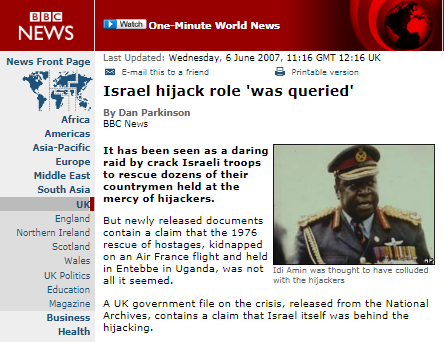h/t JS
The March 15th edition of The Times included some interesting news about a two and a half year-old complaint to the BBC in an article titled “Rift grows after BBC watchdog upholds complaint over ‘biased’ report on Israel” (£). 
“The BBC Trust has upheld a complaint which alleged that a five-minute report on Radio 4’s Today programme about the Six-Day War was misleading and biased, The Times has learnt. […]
The latest complaint relates to an item which aired on the Today programme in June 2011. The report, by Kevin Connolly, one of the BBC’s Middle East correspondents, examined the legacy of the 1967 conflict between Israel and several neighbouring states.
According to the trust’s findings, which were obtained by The Times, a listener alleged that the Today report wrongly gave the impression that Israel occupied land three times its original size as a result of the war, when it had given 90 per cent of the land captured in 1967 back to Egypt. The programme also, the complainant alleged, gave a misleading impression that Israel was not willing to trade land for peace, when it had reached peace deals with Jordan and Egypt that included transfers of conquered territory.
The trust found that the Today report had been inaccurate on both points and that the complaints should be upheld.”
The broadcast concerned appears to be this one from June 10th 2011.
Kevin Connolly opens that report with the following words:
“They are not borders, but lines of ceasefire – although they didn’t sound like it last weekend at Majdal Shams when Israeli soldiers used live ammunition to stop protesters trying to cross the line of disengagement with Syria.”
Readers may perhaps remember that the day before that report on the ‘Today’ programme, BBC Radio 4 had also broadcast a highly problematic item by Connolly on ‘From Our Own Correspondent’ pertaining to those “protesters” at Majdal Shams.
Interestingly, The Times also reports that: 
“BBC News had strongly defended the report during an internal complaints process that dragged on for two and a half years.”
It goes on to say:
“Both BBC News and Mr Connolly declined to comment yesterday, but the publication of the trust’s findings on March 25 is likely to lead to outrage among the corporation’s journalists.
The controversial findings against Mr Bowen in 2009 still rankle inside the corporation. This month, Mr Bowen told The Independent newspaper that the trust’s ruling, after complaints by Israeli lobbyists, was a “mistake” based on a “flawed” investigation. “One person they took advice from who was held up as independent was later appointed as Israel’s Ambassador to the United States,” Mr Bowen was quoted as saying. “He was hardly impartial.” “
As readers will recall, we discussed that portion of Jeremy Bowen’s recent interview with the Independent here.
Licence fee payers might find it very disturbing that the corporation’s journalists should be considered likely to express “outrage” at the thought of their work being held to account – according to the BBC’s own editorial guidelines and within the framework of its own self-regulating system, of course – by the members of the public who actually fund it. They may also naturally be concerned as to why it has taken two and a half years for this complaint to find its way through that self-regulating system, which was supposedly made more user-friendly not long ago.
The Times article also suggests that the BBC Trust’s findings “would appear to show the corporation has failed to learn from the 2004 Balen Report”, which of course has not been made public to this day – also at the expense of the funding public.





